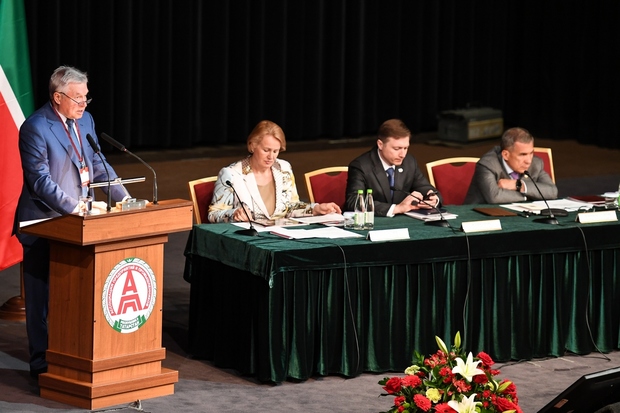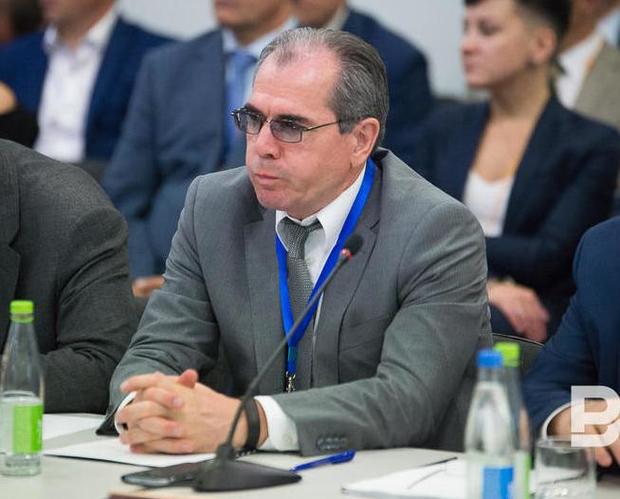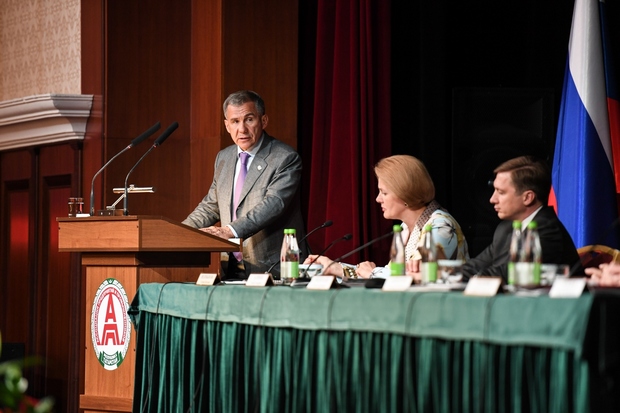''Today it is necessary to evaluate conversion opportunities of Tatarstan defence industry complex plants''
Tatarstan's defence industry will lose state contracts for rearmament of the Russian army at 7-8 billion rubles
''Problem-2020 has approached Tatarstan defence industry complex much sooner than expected: defence procurment for the next year has been cut by 30-40%, and in subsequent years it will steadily decrease,'' anxiously stated president of the Association of enterprises and industrialists of Tatarstan Aleksandr Lavrentyev at a reporting-election meeting of the Association of employers. Can we have another echo of the 90s in Tatarstan, what Jesuit decision on investment incentives Moscow has invented and why the rector of KNRTU-KAI Albert Gilmutdinov wants to abandon the targeted recruitment of students for engineering companies – read in the report of a correspondent of Realnoe Vrmeya.
In homelike atmosphere
Top persons of Tatarstan industry gathered on 31 May at the reporting and election meeting of the regional Association of industrial enterprises (APP), which unites today more than 200 enterprises with a total revenue of almost 1 trillion rubles. As well as three years ago — it is the frequency the re-election of APP management takes place — generals of big businesses were invited to the familiar for them conference hall of Korston.
However, this time the purely businesslike atmosphere of the upcoming election was ''violated'' by an inappropriate hanging at the entrance theatrical curtain of red colour with yellow pompons. To enter the hall, it was necessary to move these three-meter curtains to the side. What did they hang them? It seems that the organizers of APP worked hard to provide the audience with a homely ambience. In fact, without these ridiculous decorations, it was felt the warmth of the friendly relations that bound directors general of the defence industry complex. Twenty minutes before the beginning, CEOs of Tochmash, Kazan Motor Production Association, Kazan compressor plant already exchanged handshakes in the hall, Director General of APP Alexey Pakhomov was gladly met by the head of the Federation of trade unions Tatyana Vodopyanova. In the hall there gathered nearly 70 top executives. Without delay, exactly at the appointed time from under the red curtains there came President of Tatarstan Rustam Minnikhanov, a Moscow guest, Executive Vice-President of the Russian Union of Industrialists and Entrepreneurs Viktor Chemezov accompanied by the head of APP Alexander Lavrentyev.

The defence undustry complex feels itself not very confident
By contrast, the speech of President of APP Alexander Lavrentyev was without lyrical pompons. It summarized the past three years, 2014-2016, which are considered to be the most difficult for Tatarstan economy. Since the end of 2014, with the devaluation of the ruble, the economic growth in the country has stopped, beginning to stagnate. ''These years have passed with no sudden shocks: the loss in some sectors has been offset by growth in others,'' described the state of the industry Aleksandr Lavrentyev. ''Last year, the GRP growth amounted to 2,5% to 1,9 trillion rubles, and production growth – 3,5%,'' he reminded.
''However, the defence industry complex feels itself not very confident, there is every reason to believe that it will be difficult to ensure a growth of production volumes,'' he reached the basic problem of the report. According to him, the state defence order for Tatarstan enterprises of the defence industry in 2018 has been reduced by 30-40% and ''in subsequent years it will steadily decline.'' In rubles terms, we are talking about the loss of state contracts for the rearmament of the Russian army by 7-8 billion rubles. However, President Vladimir Putin has repeatedly warned about the impending reduction, indicating that the programme of rearmament of the Russian army will end in 2020. So the problem 2020 should not happen as a surprise for Tatarstan defence industry.
''Now it is necessary to assess conversion opportunities of the Tatarstan plants at the session of Economic Council under the President of Tatarstan,'' he addressed to Rustam Minnikhanov, after receiving his approving.
Rich and poor: they all cry
Another urgent issue for the industry remains the acute shortage of investment capital for modernisation. Aleksandr Lavrentyev again complained of expensive bank loans, issued at 15%. ''This is significantly higher than the profitability in many sectors of the economy,'' he blamed on the greed of the bankers.
Despite this, Tatarstan enterprises, as Lavrentyev stated, are finding solution by investing its own funds. ''Last year the volume of investments amounted to 654 billion rubles, 70% of which have been taken from the own capital of the enterprises,'' he stated. ''Only 2% of investments account for mechanical engineering,'' he said. In other words, the gap between ''rich'' and ''poor'' enterprises is becoming more striking.

''It still fails to turn the tax system into an instrument of economic policy, not just fiscal exemption,'' continued Lavrentyev. ''Today the tax burden on the GRP is 30%. At the same time, the government consistently discuss an increasing of taxes after the moratorium after 2019. Few is offered for GRP.''
According to him, an example of the Jesuit policy is the Russian government's decision to extend investment incentives to upgrade production. According to him, Moscow has offered the regions to provide benefits at the expense of the regional component of the tax rate on profit, which has made the mechanism invalid.
KNRTU-KAI: we are not going to admit students with unsatisfactory marks!
The debate around the training of engineering personnel was raised again. The rector of KNRTU-KAI Albert Gilmutdinov rebuked the industrialists that they direct school graduates with low exam scores in Mathematics and Physics to target areas. ''We have the average score received on the competitive basis of 70.5, and on target groups — 61,4. With these points without competition we admitted last year 177 people, or 20% of the total set. Out of them, 37 people have 30-40 points in Mathematics and Physics. These young people cannot be taught Further Mathematics! We should do something with that!'' he said indignantly.
Here Rustam Minnikhanov intervened, who previously was silent. ''You should not admit with such points — they will come to our enterprises,'' he supported.

In conclusion, APP members re-elected Aleksander Lavrentyev for the new three-year term.